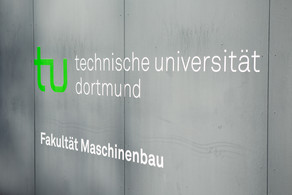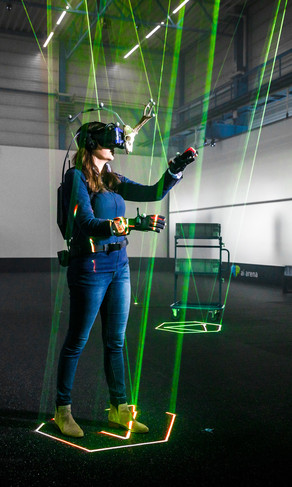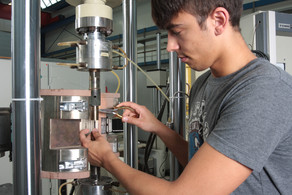DFG extends Transregio of TU Dortmund University and RWTH Aachen University
- News
- News

Forming processes can be used to efficiently produce complex and customized components. However, forming also causes microscopic damage to the material. Since 2017, the TRR 188 has been providing important insights into the damage caused by forming processes during the production of metallic components. The scientists are not only focusing on identifying the damage mechanisms, but also on controlling them during the forming process and predicting their effects on the performance of the components. This novel approach makes it possible to take into account the actual product properties, including the damage caused by production, as early as the design stage of products and their manufacturing processes.
The result is a new generation of lightweight products with customized and known performance. Prof. Yannis P. Korkolis from the Institute of Forming Technology and Lightweight Structures (IUL) and designated third spokesperson of TRR 188 explains: "As a final result of the three funding periods, we are aiming for a paradigm shift in design by enabling manufacturers to adjust forming-induced damage in manufacturing processes to achieve the desired material behavior during operation. At the same time, they can conserve material and energy resources."
Transfer to industrial practice
The researchers also demonstrate this using specific demonstrator components. There were already three industrial transfer projects in TRR 188 in the second funding period to transfer the results into practice. The DFG has now approved a fourth for the third funding period. The transfer projects, as well as the increasing number of inquiries from industry, underline the relevance of the research results achieved to date.
In the first two funding periods, the TRR members have already been able to show that it is possible to influence and actively control damage through process modifications for many typical sheet metal and bulk metal forming processes. In the third funding period, the scientists are incorporating further previously undiscovered damage phenomena into their 23 individual projects. In addition to analyzing new and more complex processes, they are also extending their findings on typical steels to other materials such as aluminum and the industry-relevant press-hardening steel 22MnB5. For the first time, steels with self-designed, damage-resistant microstructures are also being produced in order to demonstrate their damage tolerance in further processing and in use.
Interdisciplinary cooperation
The TRR 188 is supported by an interdisciplinary consortium from the fields of forming technology, materials science, materials testing and mechanics. Prof. Yannis P. Korkolis from the Institute of Forming Technology and Lightweight Construction (IUL, TU Dortmund University) will be the spokesperson for the third funding period, while Prof. Sebastian Münstermann (IBF, RWTH Aachen University) will be his deputy. In addition to the IUL, the Institute of Mechanics (IM) and the Department of Materials Testing Technology (WPT) will continue their research in TRR 188 at the Dortmund site. The Chair of Reliability Engineering (CRE) is a new member.
The Institute for Applied Materials at KIT in Karlsruhe is also still involved in the Collaborative Research Center. The two Mercator professors Prof. Kaan Inal (University of Waterloo, Canada) and Prof. Reinhard Pippan (Austrian Academy of Sciences) are also continuing to support TRR 188 in the third funding period. In addition to numerous Alexander von Humboldt fellows, the TRR 188 has already brought several international doctoral students to Dortmund as part of research stays.
Lecture series on the topic of damage for teaching and training purposes (in English)
Contact person for queries:
Prof. Dr. Ioannis Korkolis
E-mail : yannis.korkolis@tu-dortmund.de
Phone: +49 231 755 8420
Institute of Forming Technology and Lightweight Construction
Department of Mechanical Engineering







![[Translate to English:] [Translate to English:]](/storages/zentraler_bilderpool/_processed_/c/6/csm_Internationale_Studierende_aus_Ecuador_aae423f6a4.jpg)
![[Translate to English:] [Translate to English:]](/storages/mb/_processed_/6/b/csm_Maschinenbau-Gebaeude_Foto_TU_Dortmund_Juergen_Huhn2_8aae711271.jpg)